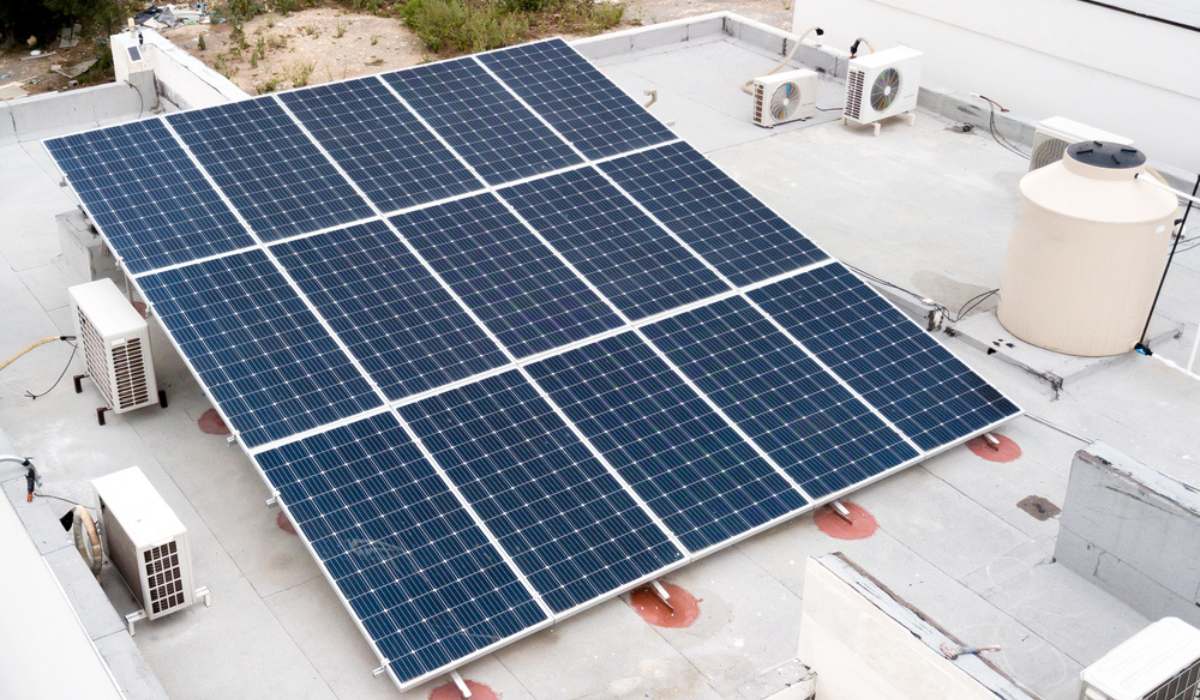Solar panels are an excellent source of renewable energy that can help you save money on your electricity bills while reducing your carbon footprint. However, to keep them performing at their best, it is crucial to keep them clean. Over time, dirt, dust, and other debris can accumulate on the surface of the panels, which can reduce their efficiency and output. In this article, we will discuss some simple steps to clean your solar panels and keep them working efficiently for years to come.
See also: How to clean chimneys?
Step-by-step guide to clean solar panels
Step 1: Gather tools and safety equipment
For cleaning solar panels, you can buy the necessary tools from a nearby hardware store. You can clean the solar panels just like you clean windows or any other glass surface. To clean them, mix water with a mild soap to create a cleaning solution. You can use a soft sponge or brush to scrub them gently. To remove the excess water, you can use a lint-free cloth or squeegee. Safety is very important when it comes to cleaning solar panels. If you need to work on the roof, it’s recommended that you wear a hard hat, use ladder support, and wear a harness to avoid any accidents.
Step 2: Turn off the solar panel system
If you want to clean your solar panels on your own, you need to make sure they are turned off first. Solar panels are electrical equipment, and it’s not safe to clean them while they are still producing electricity. You can find instructions from your solar panel manufacturer on how to turn off the electrical currents to the panel and your home.
Step 3: Dislodge any dirt
Solar panels tend to gather leaves, dust, and bird droppings over time. While rain can help in removing some of the dirt, it may not always be enough and may leave behind some residue when puddles dry up. To clean the panels, it is recommended to use a soft-bristled tool to gently brush off any debris. You can attach a telescopic extension pole with a threaded tip or hook to the soft brush for cleaning solar panels from the ground. Some poles can extend up to 24 feet, making it easier to reach high places.
If you don’t have a long extension pole, you may need to use an extension ladder to reach your solar panels. Climbing onto the roof can be dangerous, so it’s important to take safety precautions, such as wearing a hard hat and harness. To clean your solar panels, start by gently brushing them. This is the best way to clean them because if there’s a lot of debris in the panels, immediately mixing it with water can cause it to spread and smear. Brushing helps break down and remove some of the debris, making the rest of the cleaning process more effective. It’s also a good idea to wear work gloves to keep your hands clean and safe. Finally, check if your panels have drainage holes and ensure they are clear. You can clean these holes by inserting a toothpick inside.
Step 4: Clean the panels
Water is very important for cleaning solar panels. First, you should remove any dry dirt or debris with a brush. Then, you can use a garden hose to clean the remaining dirt. Some people may want to use a lot of water to clean the solar panels quickly, but this is not a good idea.
Using high-pressure water can make small cracks on the panels, which will make the solar system work less well and cause problems in the future. It may also cancel any warranty on the panels. If your hose has a high-pressure attachment, you should take it off before cleaning the solar panels. The most important thing is to spray water carefully and slowly on each panel. If your garden hose does not give you enough control, you can use a special wand that will help you spray the water in the right way.
Step 5: Scrub any problem areas
After using water to remove most of the dirt, you can use a sponge, squeegee, or soft cloth with clean water to clean the remaining spots on your solar panels. It’s important to be gentle and patient since harsh scrubbing may damage the panels.
Even cleaning products that are considered safe for solar panels can be harsh. The best way to clean your solar panels is to use water, specifically deionized or distilled water. This type of water attracts dirt and grime, which makes it more effective for cleaning. If you don’t have deionized or distilled water, you can treat regular hose water with a water softener to make it better for cleaning.
Step 6: Apply a cleaning solution for heavily soiled areas
If your solar panels have spots that are tough to clean with water, you can mix a little bit of mild dish soap with vinegar and water. However, don’t use strong chemicals as they can damage the panels. When using soap, use it carefully and not too much, because if you don’t rinse it well, it can leave a residue that attracts dirt and makes your panels streaky. This can make your panels look bad and can also affect how well they work. Instead of soap, you can use glass cleaner which is designed to not leave streaks.
Step 7: Use a squeegee or soft cloth to dry the panels
To prevent leaving spots and lines on the glass, it is necessary to dry each section thoroughly. If you are using a squeegee, start from the top of the section and glide down till it’s dry. If there are still any drops left, use a soft cloth to wipe them off. It’s important to select a gentle cloth because even a seemingly soft towel can scratch the surface of the glass.
Step 8: Restart the system
Solar panels are devices that can produce energy by using the sun’s rays. To make them work better, they need to be set up in places where there is more sunlight. The amount of energy solar panels can produce is measured in watts, which is determined by various factors such as the location of the solar system and the environment.
Step 9: Contact a solar panel professional
If you have solar panels installed for generating electricity at home, it is important to keep them clean. Sometimes, cleaning solar panels can be difficult and require professional help. You can either contact the company that installed the panels or hire a separate company that specialises in cleaning solar panels.
FAQs
Why is it important to clean solar panels?
It is important to clean solar panels because dust, dirt, bird droppings, and other debris can accumulate on the panels, which can reduce their efficiency and lower their energy output.
How often should solar panels be cleaned?
There is no set schedule for cleaning solar panels, but it is recommended to clean them at least once a year or when you notice a decrease in energy output.
Can I clean my solar panels myself or should I hire a professional?
You can clean your solar panels yourself, but if you are not comfortable doing so or if your panels are difficult to access, it may be best to hire a professional.
What should I do if my solar panels are damaged during cleaning?
If your solar panels are damaged during cleaning, contact the manufacturer or a professional installer for assistance. Do not attempt to repair the damage yourself.
Can I clean my solar panels with a pressure washer?
It is not recommended to use a pressure washer to clean solar panels, as the high pressure can damage the panels and their components.
What is the best time of day to clean solar panels?
The best time of day to clean solar panels is early in the morning or late in the evening, when the panels are cool and the sun is not shining directly on them.
How to prevent debris from accumulating on my solar panels?
You can prevent debris from accumulating on your solar panels by trimming nearby trees and shrubs, installing bird deterrents, and keeping the surrounding area clean and free of debris.
| Got any questions or point of view on our article? We would love to hear from you. Write to our Editor-in-Chief Jhumur Ghosh at jhumur.ghosh1@housing.com |







